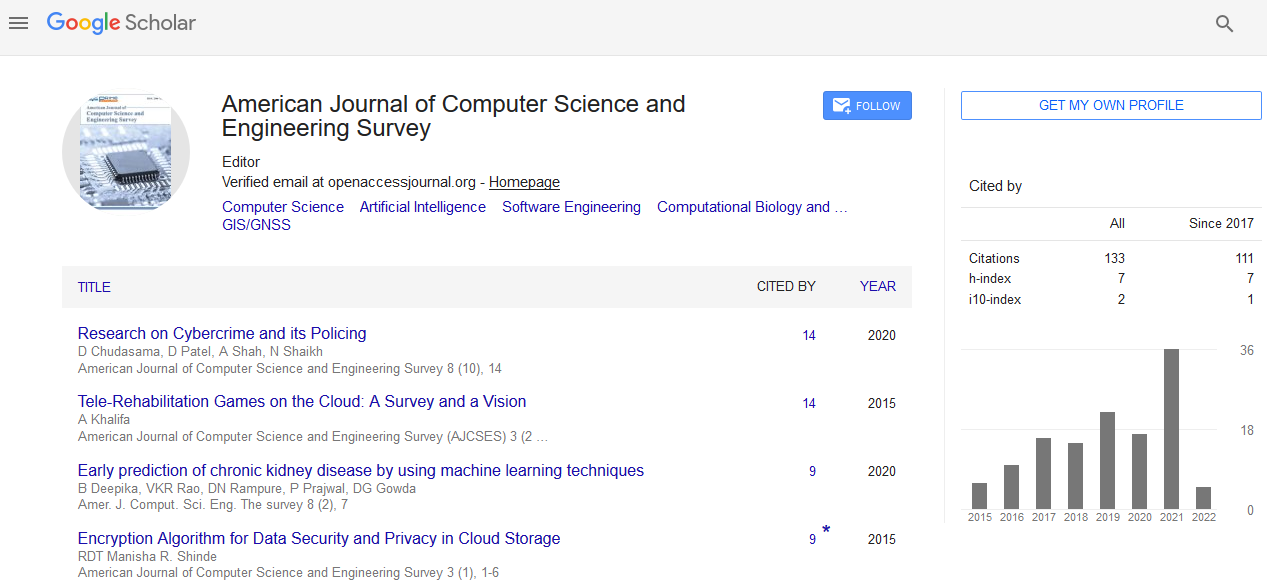Perspective - (2023) Volume 11, Issue 2
Enhancing Science Education through Adaptive Gamification
Luca Costa*
Department of Computer Science, Federal University of Minas Gerais, Brazil
*Correspondence:
Luca Costa,
Department of Computer Science, Federal University of Minas Gerais,
Brazil,
Email:
Received: 31-May-2023, Manuscript No. ipacses-23-17192 ;
Editor assigned: 02-Jun-2023, Pre QC No. ipacses-23-17192 (PQ);
Reviewed: 16-Jun-2023, QC No. ipacses-23-17192;
Revised: 21-Jun-2023, Manuscript No. ipacses-23-17192 (R);
Published:
28-Jun-2023, DOI: 10.36846/2349-7238.23.11.19
Introduction
As of late, gamification has caught the consideration of scientists
and teachers, especially in science training, where understudies
frequently express pessimistic feelings. Gamification
strategies mean to rouse students to partake in advancing by
consolidating characteristic and extraneous persuasive variables.
In any case, the viability of gamification has yielded
changing results, provoking specialists to investigate versatile
gamification as an elective methodology. By and by, there
should be more examination on versatile gamification draws
near, especially concerning inspiration, which is the essential
target of gamification. In this review, we created and tried a
versatile gamification climate in light of explicit persuasive and
mental systems. This climate consolidated versatile standards,
learning techniques, gaming components, and all vital parts of
science training for six classes of 3rd grade understudies in elementary
school.
Description
We utilized a quantitative way to deal with gain bits of knowledge
into the inspirational effect on understudies and their
view of the versatile gamification application. We intended
to comprehend what each game component experienced by
understudies meant for their inspiration. In view of our discoveries,
understudies were more roused to learn science
while utilizing a versatile gamification climate. Furthermore,
the transformation cycle was to a great extent fruitful, as understudies
commonly enjoyed the game components coordinated
into their examples, demonstrating the viability of the
multi-layered structure utilized in upgrading understudies’ encounters
and commitment. Teachers have reliably focused on
understudies’ dynamic support in the homeroom as a principal
perspective. With the unique impact and ceaseless advancement
of innovation, fundamental to foster inventive learning
conditions take special care of the necessities and interests of
contemporary students, accordingly encouraging a drawing
in and motivating instructive experience. The fulfillment of
elevated degrees of understudy commitment and inspiration
is vital, as exploration decidedly affects scholarly accomplishment.
Lately, there has been a remarkable expansion in the use
of computerized games across different spaces, including the
scholarly world. This pattern has started the interest of specialists
and professionals, prompting the development of a clever
methodology known as gamification. The Coronavirus pandemic
has additionally featured a continuous test wherein various
understudies battle to control their inspiration, especially
inside computerized learning settings successfully. Advancing
science training is significant for the advancement of our general
public and the improvement of people who have logical
education, empowering them to grasp and value the complexities
of the world. Science schooling sustains fundamental acquiring
abilities and cultivates perspectives that accentuate the
meaning of proof based decision-production while supporting
social and natural awareness. These advantages stretch out to
people no matter what their future contribution in the areas of
science and innovation. Not with standing, different elements
can impact science learning, like educator self-viability and inspiration,
topographical contrasts, distinctions in sexual orientation,
and school setting.
Conclusion
The rising notoriety of games in our general public has ignited
huge interest among teachers and educational engineers in an
idea known as gamification. Albeit the expression “gamification”
was at first presented in 2008, it was only after 2010 that
it acquired more extensive acknowledgment. From that point
forward, its prominence has kept on developing consistently
and stays a focal idea today. Gamification in training alludes to
“consolidating game mechanics, feel, and the mental and conduct
perspectives related with games into non-game-related
instructive substance.” This approach means to connect with
and inspire understudies, address testing circumstances, and
upgrade the growth opportunity through advanced materials.
Citation: Costa L (2023) Enhancing Science Education through Adaptive Gamification. Am J Comp Science. 11:19.
Copyright: © 2023 Costa L. This is an open-access article distributed under the terms of the Creative Commons Attribution License, which permits unrestricted use, distribution, and reproduction in any medium, provided the original author and source are credited.

